Cheung Chau Island
We went to Cheung Chau Island today. It's a weird dumbbell shape, with a narrow isthmus between two lobes: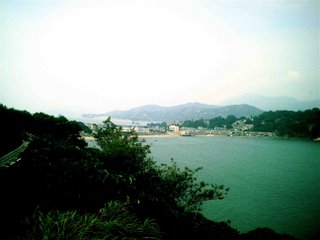
There are so many contrasts crammed together here. Open natural green areas, windsurfers congregating to find the ideal spot, locals living a simple and laid back life fishing and chatting away the day in shops, crowded alleyways with merchandise piled in storefronts:
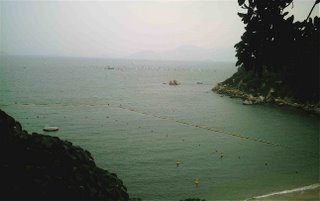
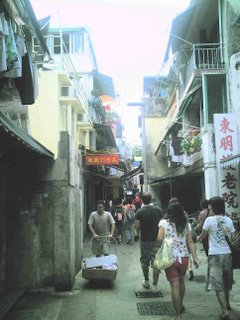
The only motorized vehicles were occasional three-wheel carts, like this one:
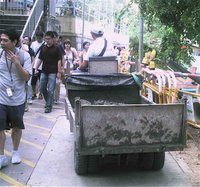
People like the beach here.
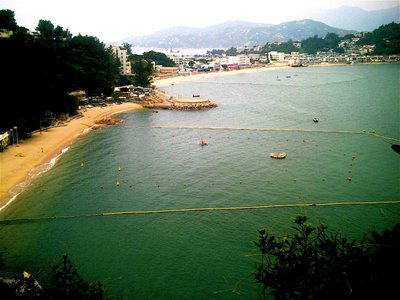
There are a few Pepperdine students sunning themselves on the nearest floating platform in the water.
There are also a few fun rock formations:
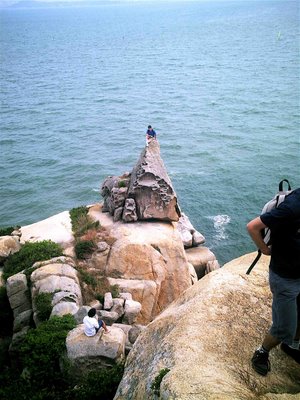
That's Nate from Baylor on the rock in question, and YiChieh Chang (one of the Pepperdine students) heading toward him.
It was near Flower Vase Rock and Human Head Rock. I'm hoping the last one was not named in the same syntactic pattern as "Steak knife".
I don't know what this rock formation was called. On it is painted in white the characters "ding dong", which apparently refers to a Japanese cartoon character popular in Hong Kong.
In general, it seems that this island has a bunch of nice things, that they decided to market overly aggressively, to the point where they're putting up signs toward rock formations that most people would stop to say, "huh".
They have a "Little Great Wall of China". It looks like this:
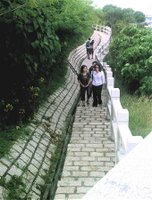
We had been walking on it for about a minute before I asked where the "Little Great Wall" was. "It's right here".
Oh.
I think the same person who started naming random rock formations and putting signs not only by them, but pointing along the trail to them, and putting informational signs with maps featuring these formations as major sites, is the same person who decided this rock trail should be called "the Little Great Wall of China".
But one fun thing to see along the Little Great Wall was their fire control equipment, at various points on the trail:
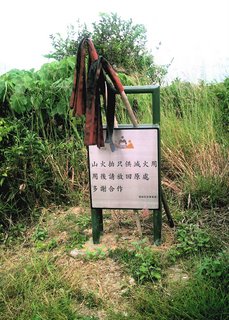
In general, it seems there is a lot more open green space in the Hong Kong area than you'd think there would be, for the population density. Much of the land is public park land, especially in the very mountainous areas where you can't really build anything. That's why the apartment buildings are so tall. The limited remaining land is required to house everyone. This is especially true on these outlying islands. No highrises here.
People also had pets here. The SPCA had big signs around, but I think they were redundant. It's interesting: in Hong Kong I hadn't seen a lot of people walking their pets around, but here it was common. There were sandboxes for dogs to do their business in (like a kitty litter box). We saw a couple of cats that wandered around like they owned the place. One was stretched out on a schoolyard, and lifted his head only to see us go by. Another was on the ancient rock carvings (discovered 1970--ancient Chinese rock carvings-- hmm... more hype?) but since there was a cage protecting the rock carvings from humans, the cat had the area all to himself. That is, until he decided to chase a bird, and left the cage.
People were walking their dogs everywhere, including on the beach, by signs that said very plainly, "no dogs".
Come to think of it, the signs said "No kites" but not only were there kites, there were kiteboarders!
This is got to be the only time I've seen a playground with this sign.
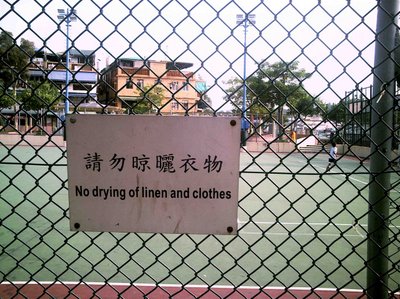
Yes, it says, "No drying of linen and clothes." Now pan left, and...
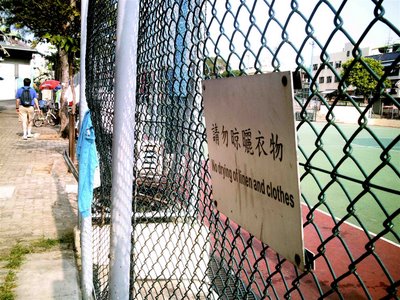
It's also the only time I've seen clothes actually hanging on the fence of a playground. Yes, not only the blue shirt in the foreground, but clotheslines attached to the fence of this playground. This was called the "Temple Playground" because it was attached to a temple. I don't have pictures of it, because I got tired of taking pictures of temples, as if that were the only thing interesting about a place.
Still trying to figure out the steak knives comment? Hint: do it like an SAT analogy, like "steak knives are called that because they are..., just as human head rock is called that because it is a ....".


0 Comments:
Post a Comment
<< Home